Parental Expectations Leading to Increased Competitiveness in Students
VerifiedAdded on 2023/06/15
|5
|1405
|241
Essay
AI Summary
This essay explores the influence of parental expectations on the increasing competitiveness among students, particularly in Singapore. It highlights how parents' desires for their children to succeed, often fueled by the achievements of potential employers, can create immense pressure on students. The essay delves into the Singaporean education system, known for its impressive academic results but also for its high levels of stress and competition. It discusses how parental expectations, while intended to motivate, can lead to negative consequences such as increased mental pressure and even suicide. The essay argues for a more supportive environment where children are allowed to learn from their mistakes and explore their potential at their own pace, emphasizing the importance of parental involvement and support alongside high expectations.
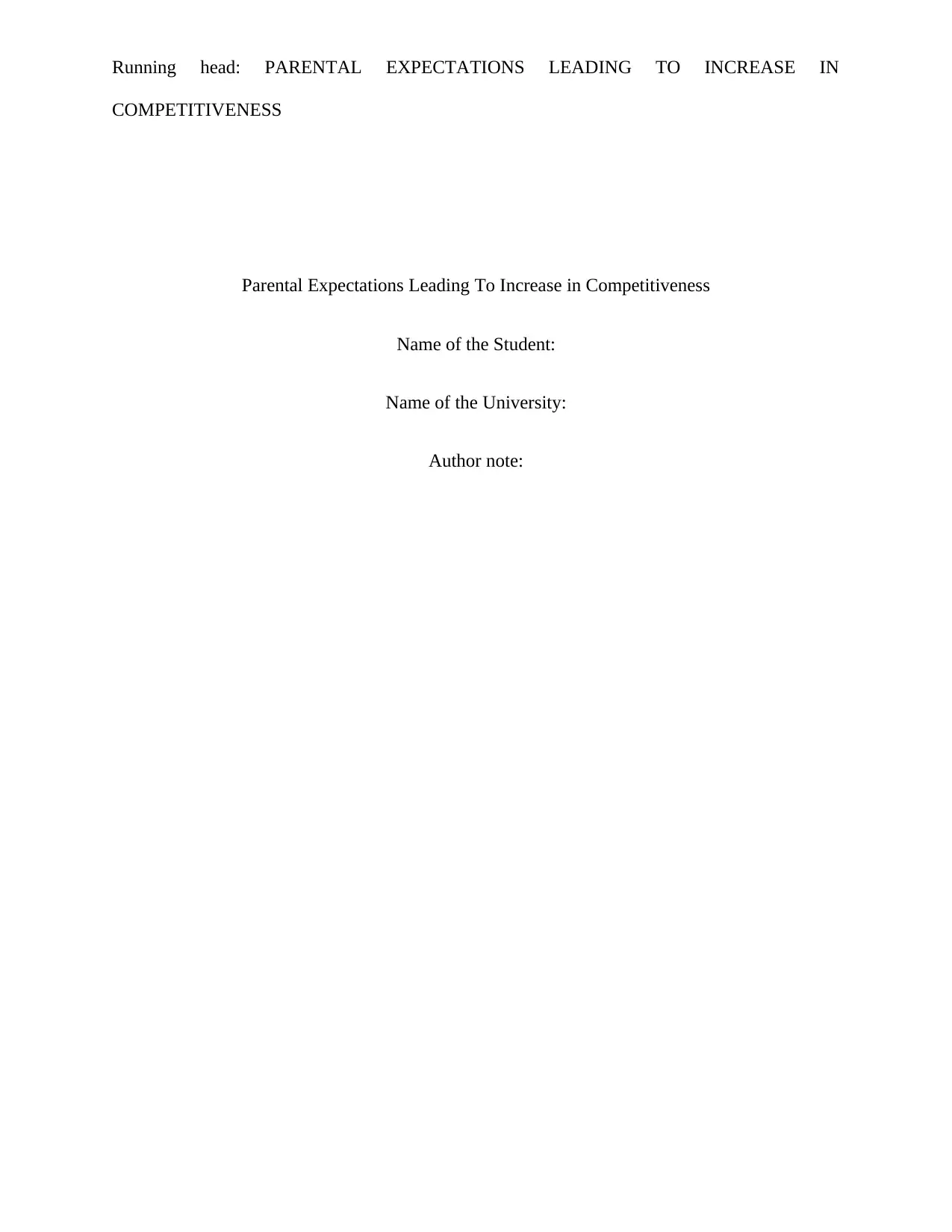
Running head: PARENTAL EXPECTATIONS LEADING TO INCREASE IN
COMPETITIVENESS
Parental Expectations Leading To Increase in Competitiveness
Name of the Student:
Name of the University:
Author note:
COMPETITIVENESS
Parental Expectations Leading To Increase in Competitiveness
Name of the Student:
Name of the University:
Author note:
Paraphrase This Document
Need a fresh take? Get an instant paraphrase of this document with our AI Paraphraser
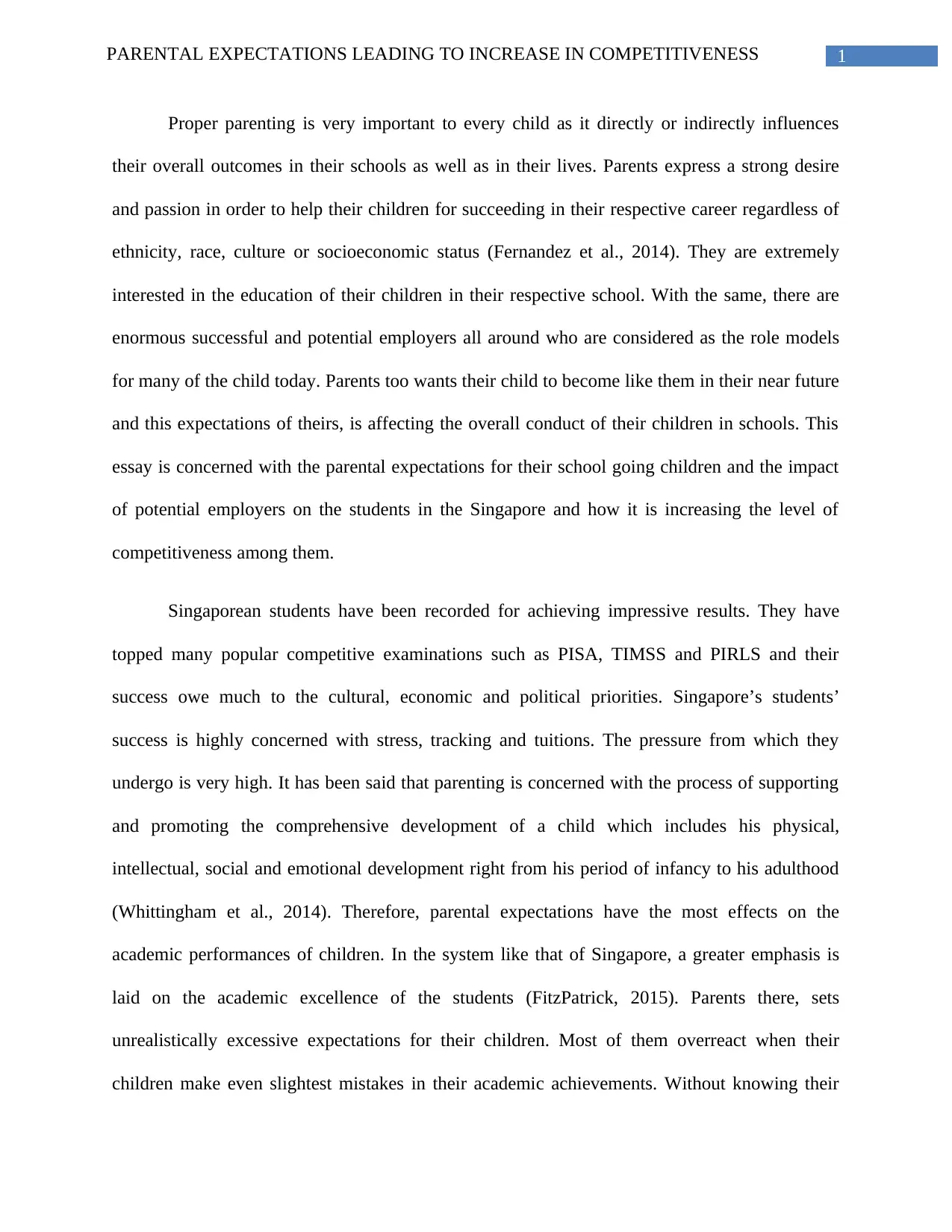
1PARENTAL EXPECTATIONS LEADING TO INCREASE IN COMPETITIVENESS
Proper parenting is very important to every child as it directly or indirectly influences
their overall outcomes in their schools as well as in their lives. Parents express a strong desire
and passion in order to help their children for succeeding in their respective career regardless of
ethnicity, race, culture or socioeconomic status (Fernandez et al., 2014). They are extremely
interested in the education of their children in their respective school. With the same, there are
enormous successful and potential employers all around who are considered as the role models
for many of the child today. Parents too wants their child to become like them in their near future
and this expectations of theirs, is affecting the overall conduct of their children in schools. This
essay is concerned with the parental expectations for their school going children and the impact
of potential employers on the students in the Singapore and how it is increasing the level of
competitiveness among them.
Singaporean students have been recorded for achieving impressive results. They have
topped many popular competitive examinations such as PISA, TIMSS and PIRLS and their
success owe much to the cultural, economic and political priorities. Singapore’s students’
success is highly concerned with stress, tracking and tuitions. The pressure from which they
undergo is very high. It has been said that parenting is concerned with the process of supporting
and promoting the comprehensive development of a child which includes his physical,
intellectual, social and emotional development right from his period of infancy to his adulthood
(Whittingham et al., 2014). Therefore, parental expectations have the most effects on the
academic performances of children. In the system like that of Singapore, a greater emphasis is
laid on the academic excellence of the students (FitzPatrick, 2015). Parents there, sets
unrealistically excessive expectations for their children. Most of them overreact when their
children make even slightest mistakes in their academic achievements. Without knowing their
Proper parenting is very important to every child as it directly or indirectly influences
their overall outcomes in their schools as well as in their lives. Parents express a strong desire
and passion in order to help their children for succeeding in their respective career regardless of
ethnicity, race, culture or socioeconomic status (Fernandez et al., 2014). They are extremely
interested in the education of their children in their respective school. With the same, there are
enormous successful and potential employers all around who are considered as the role models
for many of the child today. Parents too wants their child to become like them in their near future
and this expectations of theirs, is affecting the overall conduct of their children in schools. This
essay is concerned with the parental expectations for their school going children and the impact
of potential employers on the students in the Singapore and how it is increasing the level of
competitiveness among them.
Singaporean students have been recorded for achieving impressive results. They have
topped many popular competitive examinations such as PISA, TIMSS and PIRLS and their
success owe much to the cultural, economic and political priorities. Singapore’s students’
success is highly concerned with stress, tracking and tuitions. The pressure from which they
undergo is very high. It has been said that parenting is concerned with the process of supporting
and promoting the comprehensive development of a child which includes his physical,
intellectual, social and emotional development right from his period of infancy to his adulthood
(Whittingham et al., 2014). Therefore, parental expectations have the most effects on the
academic performances of children. In the system like that of Singapore, a greater emphasis is
laid on the academic excellence of the students (FitzPatrick, 2015). Parents there, sets
unrealistically excessive expectations for their children. Most of them overreact when their
children make even slightest mistakes in their academic achievements. Without knowing their
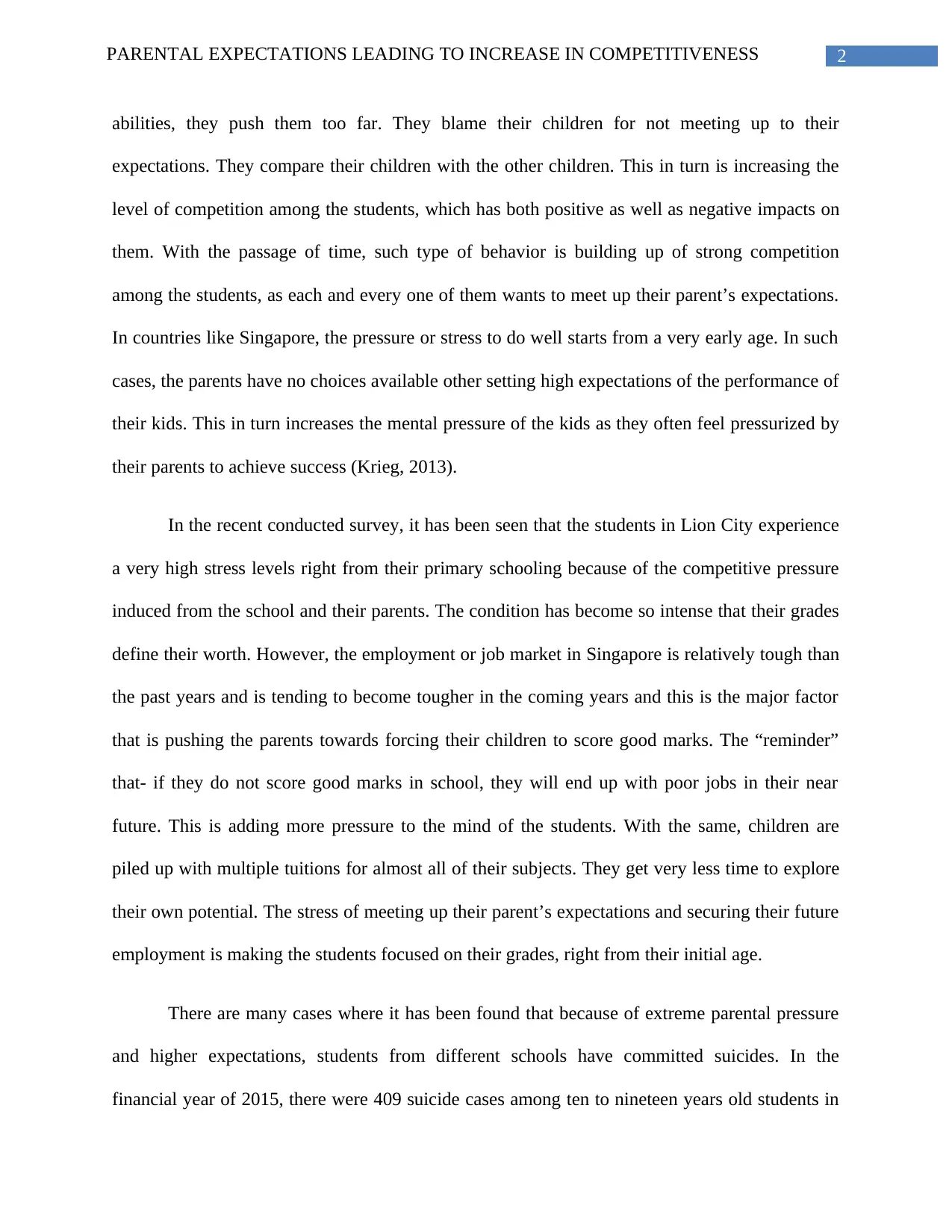
2PARENTAL EXPECTATIONS LEADING TO INCREASE IN COMPETITIVENESS
abilities, they push them too far. They blame their children for not meeting up to their
expectations. They compare their children with the other children. This in turn is increasing the
level of competition among the students, which has both positive as well as negative impacts on
them. With the passage of time, such type of behavior is building up of strong competition
among the students, as each and every one of them wants to meet up their parent’s expectations.
In countries like Singapore, the pressure or stress to do well starts from a very early age. In such
cases, the parents have no choices available other setting high expectations of the performance of
their kids. This in turn increases the mental pressure of the kids as they often feel pressurized by
their parents to achieve success (Krieg, 2013).
In the recent conducted survey, it has been seen that the students in Lion City experience
a very high stress levels right from their primary schooling because of the competitive pressure
induced from the school and their parents. The condition has become so intense that their grades
define their worth. However, the employment or job market in Singapore is relatively tough than
the past years and is tending to become tougher in the coming years and this is the major factor
that is pushing the parents towards forcing their children to score good marks. The “reminder”
that- if they do not score good marks in school, they will end up with poor jobs in their near
future. This is adding more pressure to the mind of the students. With the same, children are
piled up with multiple tuitions for almost all of their subjects. They get very less time to explore
their own potential. The stress of meeting up their parent’s expectations and securing their future
employment is making the students focused on their grades, right from their initial age.
There are many cases where it has been found that because of extreme parental pressure
and higher expectations, students from different schools have committed suicides. In the
financial year of 2015, there were 409 suicide cases among ten to nineteen years old students in
abilities, they push them too far. They blame their children for not meeting up to their
expectations. They compare their children with the other children. This in turn is increasing the
level of competition among the students, which has both positive as well as negative impacts on
them. With the passage of time, such type of behavior is building up of strong competition
among the students, as each and every one of them wants to meet up their parent’s expectations.
In countries like Singapore, the pressure or stress to do well starts from a very early age. In such
cases, the parents have no choices available other setting high expectations of the performance of
their kids. This in turn increases the mental pressure of the kids as they often feel pressurized by
their parents to achieve success (Krieg, 2013).
In the recent conducted survey, it has been seen that the students in Lion City experience
a very high stress levels right from their primary schooling because of the competitive pressure
induced from the school and their parents. The condition has become so intense that their grades
define their worth. However, the employment or job market in Singapore is relatively tough than
the past years and is tending to become tougher in the coming years and this is the major factor
that is pushing the parents towards forcing their children to score good marks. The “reminder”
that- if they do not score good marks in school, they will end up with poor jobs in their near
future. This is adding more pressure to the mind of the students. With the same, children are
piled up with multiple tuitions for almost all of their subjects. They get very less time to explore
their own potential. The stress of meeting up their parent’s expectations and securing their future
employment is making the students focused on their grades, right from their initial age.
There are many cases where it has been found that because of extreme parental pressure
and higher expectations, students from different schools have committed suicides. In the
financial year of 2015, there were 409 suicide cases among ten to nineteen years old students in
⊘ This is a preview!⊘
Do you want full access?
Subscribe today to unlock all pages.

Trusted by 1+ million students worldwide
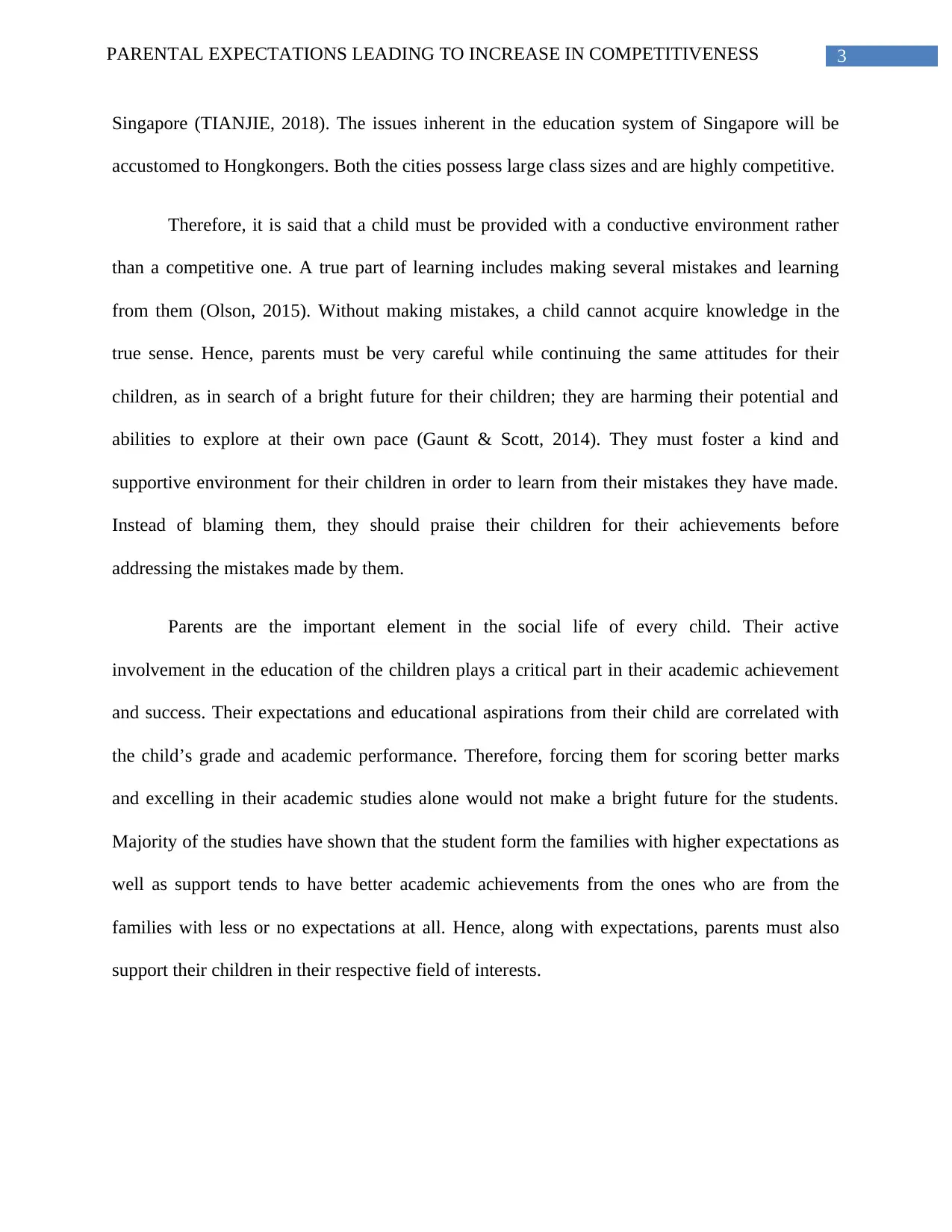
3PARENTAL EXPECTATIONS LEADING TO INCREASE IN COMPETITIVENESS
Singapore (TIANJIE, 2018). The issues inherent in the education system of Singapore will be
accustomed to Hongkongers. Both the cities possess large class sizes and are highly competitive.
Therefore, it is said that a child must be provided with a conductive environment rather
than a competitive one. A true part of learning includes making several mistakes and learning
from them (Olson, 2015). Without making mistakes, a child cannot acquire knowledge in the
true sense. Hence, parents must be very careful while continuing the same attitudes for their
children, as in search of a bright future for their children; they are harming their potential and
abilities to explore at their own pace (Gaunt & Scott, 2014). They must foster a kind and
supportive environment for their children in order to learn from their mistakes they have made.
Instead of blaming them, they should praise their children for their achievements before
addressing the mistakes made by them.
Parents are the important element in the social life of every child. Their active
involvement in the education of the children plays a critical part in their academic achievement
and success. Their expectations and educational aspirations from their child are correlated with
the child’s grade and academic performance. Therefore, forcing them for scoring better marks
and excelling in their academic studies alone would not make a bright future for the students.
Majority of the studies have shown that the student form the families with higher expectations as
well as support tends to have better academic achievements from the ones who are from the
families with less or no expectations at all. Hence, along with expectations, parents must also
support their children in their respective field of interests.
Singapore (TIANJIE, 2018). The issues inherent in the education system of Singapore will be
accustomed to Hongkongers. Both the cities possess large class sizes and are highly competitive.
Therefore, it is said that a child must be provided with a conductive environment rather
than a competitive one. A true part of learning includes making several mistakes and learning
from them (Olson, 2015). Without making mistakes, a child cannot acquire knowledge in the
true sense. Hence, parents must be very careful while continuing the same attitudes for their
children, as in search of a bright future for their children; they are harming their potential and
abilities to explore at their own pace (Gaunt & Scott, 2014). They must foster a kind and
supportive environment for their children in order to learn from their mistakes they have made.
Instead of blaming them, they should praise their children for their achievements before
addressing the mistakes made by them.
Parents are the important element in the social life of every child. Their active
involvement in the education of the children plays a critical part in their academic achievement
and success. Their expectations and educational aspirations from their child are correlated with
the child’s grade and academic performance. Therefore, forcing them for scoring better marks
and excelling in their academic studies alone would not make a bright future for the students.
Majority of the studies have shown that the student form the families with higher expectations as
well as support tends to have better academic achievements from the ones who are from the
families with less or no expectations at all. Hence, along with expectations, parents must also
support their children in their respective field of interests.
Paraphrase This Document
Need a fresh take? Get an instant paraphrase of this document with our AI Paraphraser
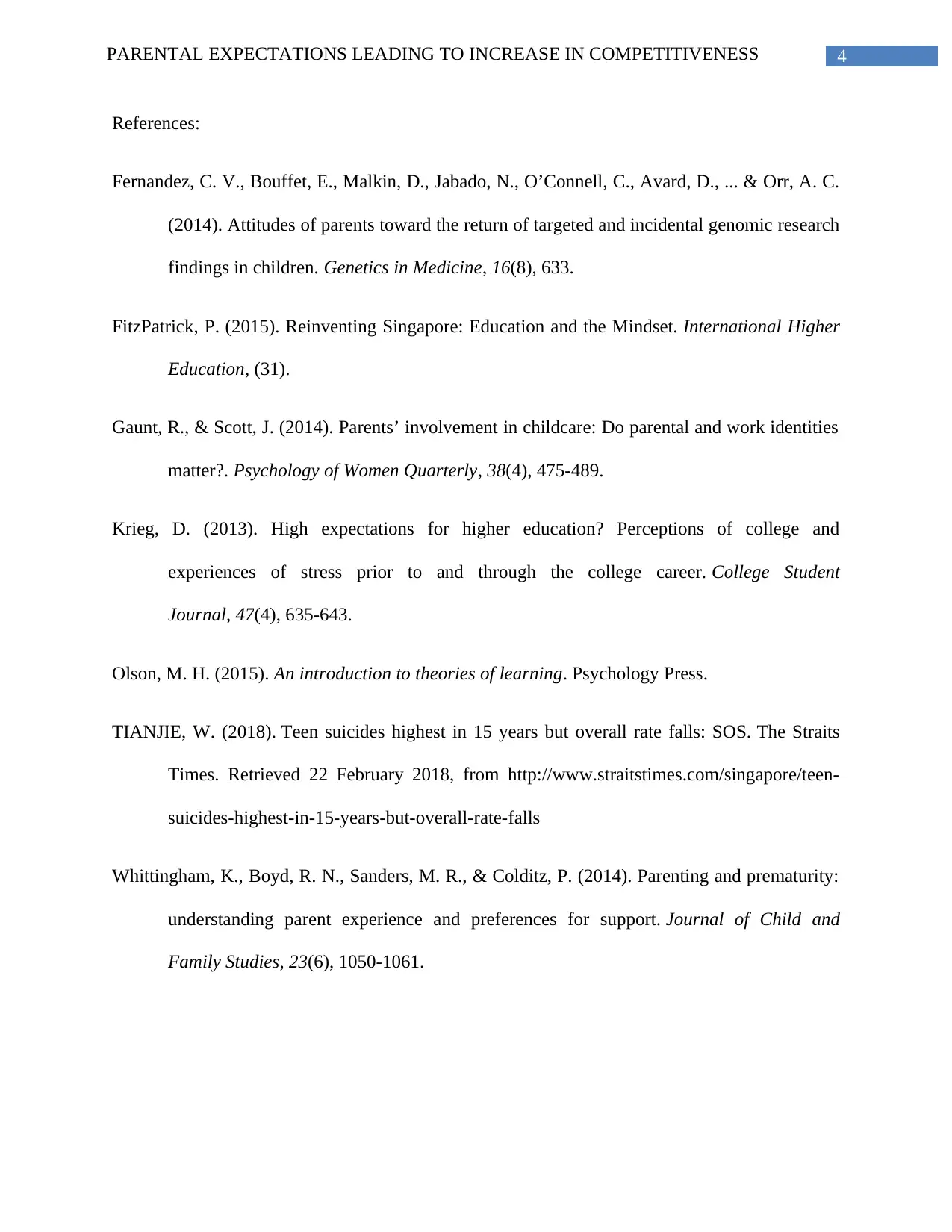
4PARENTAL EXPECTATIONS LEADING TO INCREASE IN COMPETITIVENESS
References:
Fernandez, C. V., Bouffet, E., Malkin, D., Jabado, N., O’Connell, C., Avard, D., ... & Orr, A. C.
(2014). Attitudes of parents toward the return of targeted and incidental genomic research
findings in children. Genetics in Medicine, 16(8), 633.
FitzPatrick, P. (2015). Reinventing Singapore: Education and the Mindset. International Higher
Education, (31).
Gaunt, R., & Scott, J. (2014). Parents’ involvement in childcare: Do parental and work identities
matter?. Psychology of Women Quarterly, 38(4), 475-489.
Krieg, D. (2013). High expectations for higher education? Perceptions of college and
experiences of stress prior to and through the college career. College Student
Journal, 47(4), 635-643.
Olson, M. H. (2015). An introduction to theories of learning. Psychology Press.
TIANJIE, W. (2018). Teen suicides highest in 15 years but overall rate falls: SOS. The Straits
Times. Retrieved 22 February 2018, from http://www.straitstimes.com/singapore/teen-
suicides-highest-in-15-years-but-overall-rate-falls
Whittingham, K., Boyd, R. N., Sanders, M. R., & Colditz, P. (2014). Parenting and prematurity:
understanding parent experience and preferences for support. Journal of Child and
Family Studies, 23(6), 1050-1061.
References:
Fernandez, C. V., Bouffet, E., Malkin, D., Jabado, N., O’Connell, C., Avard, D., ... & Orr, A. C.
(2014). Attitudes of parents toward the return of targeted and incidental genomic research
findings in children. Genetics in Medicine, 16(8), 633.
FitzPatrick, P. (2015). Reinventing Singapore: Education and the Mindset. International Higher
Education, (31).
Gaunt, R., & Scott, J. (2014). Parents’ involvement in childcare: Do parental and work identities
matter?. Psychology of Women Quarterly, 38(4), 475-489.
Krieg, D. (2013). High expectations for higher education? Perceptions of college and
experiences of stress prior to and through the college career. College Student
Journal, 47(4), 635-643.
Olson, M. H. (2015). An introduction to theories of learning. Psychology Press.
TIANJIE, W. (2018). Teen suicides highest in 15 years but overall rate falls: SOS. The Straits
Times. Retrieved 22 February 2018, from http://www.straitstimes.com/singapore/teen-
suicides-highest-in-15-years-but-overall-rate-falls
Whittingham, K., Boyd, R. N., Sanders, M. R., & Colditz, P. (2014). Parenting and prematurity:
understanding parent experience and preferences for support. Journal of Child and
Family Studies, 23(6), 1050-1061.
1 out of 5
Related Documents
Your All-in-One AI-Powered Toolkit for Academic Success.
+13062052269
info@desklib.com
Available 24*7 on WhatsApp / Email
![[object Object]](/_next/static/media/star-bottom.7253800d.svg)
Unlock your academic potential
Copyright © 2020–2026 A2Z Services. All Rights Reserved. Developed and managed by ZUCOL.




